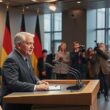A senior figure within the Christian Democratic Union (CDU), Sepp Müller, has firmly ruled out any prospect of a coalition government with the Alternative for Germany (AfD), despite the party’s recent surge in opinion polls.
Speaking to the Handelsblatt newspaper, Müller, who represents the state of Saxony-Anhalt, stated that the AfD’s political positions and style of operating are fundamentally opposed to the values and objectives of the CDU. He emphasized, “Therefore, there can and will be no cooperation with this party.
The comments follow suggestions made by Tübingen’s independent Mayor Boris Palmer, who, in the same publication, cautiously suggested a potential AfD government participation could become “possibly opportune” if the party emerges as the strongest force in regions of eastern Germany. Palmer floated the idea of establishing constitutional limitations on such a participation, such as excluding the AfD from holding key ministerial positions like those related to the constitution. He framed this as a potentially “last democratic alternative” aimed at either discrediting the AfD or transforming it into a more conventional, right-leaning, conservative party.
Müller dismissed Palmer’s proposition as an inappropriate approach for a party aiming to represent the broad electorate. He asserted that the CDU’s focus should be on developing strategies to strengthen the region, rather than waiting for external forces to shape the political landscape. Müller specifically referenced a plan to transform Saxony-Anhalt into a significant economic engine for Europe.
Political scientist Oliver Lembcke of Ruhr University Bochum acknowledged a “democratic political core” to Palmer’s argument, recognizing that democracy requires the realistic possibility of power transitions. However, Lembcke cautioned that the cost of an AfD coalition is significant, highlighting the core argument of mainstream parties: the party’s perceived hostility to the constitution. Any shift in strategy would risk damaging credibility and appearing opportunistic, as trust, which is vital for coalition building, is currently absent on both sides.





